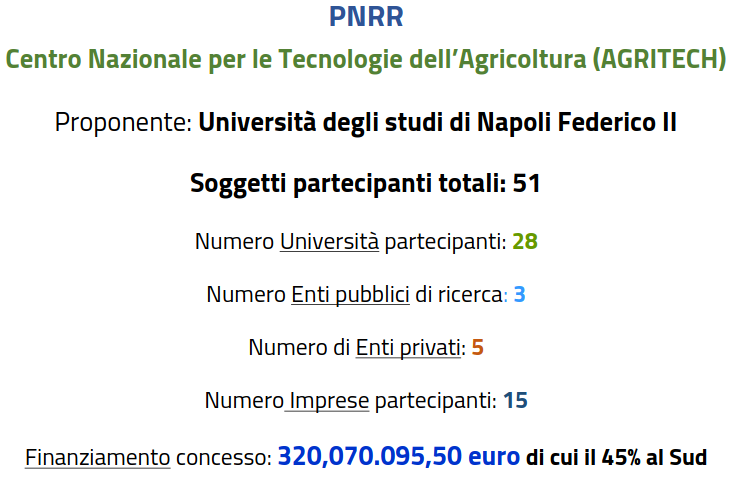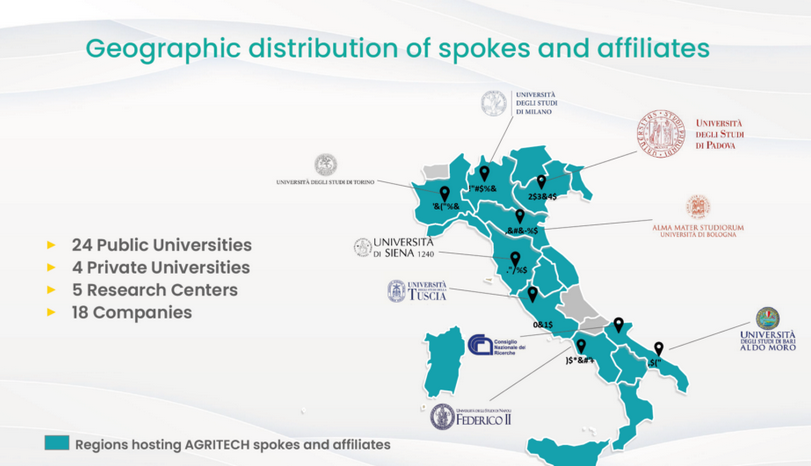PNRR Agritech

PNNR AGRITECH
 The Centre was created with the aim of bringing together the best scientific expertise in order to make the Italian agri-food industry more competitive and sustainable, and to provide a concrete response to the growth needs of a key sector of the economy: this will be achieved by linking up the national research infrastructures available in the field of agriculture; using enabling technologies to improve productivity and sustainability and promote the environmental and digital transition; working with businesses to increase the resilience and economic competitiveness of the agri-food sector; and training the next generation of scientists in the sector, thus ensuring the human capital and skills needed to meet future challenges.
The Centre was created with the aim of bringing together the best scientific expertise in order to make the Italian agri-food industry more competitive and sustainable, and to provide a concrete response to the growth needs of a key sector of the economy: this will be achieved by linking up the national research infrastructures available in the field of agriculture; using enabling technologies to improve productivity and sustainability and promote the environmental and digital transition; working with businesses to increase the resilience and economic competitiveness of the agri-food sector; and training the next generation of scientists in the sector, thus ensuring the human capital and skills needed to meet future challenges.
There are five main objectives that the Centre intends to pursue through the application of agricultural technologies:
- Resilience: i.e. adapting production to sustainability criteria and climate change;
- Low impact: i.e. reducing waste and environmental impact;
- Circularity, through the development of circular economy strategies;
- Recovery, through the development of marginal areas;
- Traceability: promoting the safety, traceability and typicality of agri-food chains.

The Centre will be structured according to the Hub&Spoke approach, with a coordinator in Naples and 9 research nodes equally distributed in Northern, Southern and Central Italy, in line with the principle of reducing the gaps underlying the Pnrr programme. The coordinators of the 9 spokes are National Research Council, Alma mater studiorum – University of Bologna, University of Bari, University of Milan, University of Bologna, University of Padua, University of Siena, University of Tuscia, University of Naples Federico II. The inter-spokes activities of the Hub will focus on the monitoring of project development and administrative management, the creation of an Agritech Academy and the organisation and management of technology transfer initiatives. Each Spoke will develop one or more Living Labs to carry out research activities, test and validate technologies and support business experimentation.

The promoter and manager of the National HUB is the Federico II University of Naples, and the chosen venue is the former Manifattura Tabacchi complex.
The other subjects involved, in addition to the subjects that will play the role of coordinators of the foreseen spokes, are University of Turin, Euro-Mediterranean Centre on Climate Change, Council for Agricultural Research and Analysis of Agricultural Economics, New Technologies, Energy and Sustainable Economic Development, Founded Edmund Mach, Politecnico di Milano, Politecnico di Torino, Scuola Superiore Sant’Anna, University of Basilicata, University of Bolzano, University Campus Bio-Medico of Rome, Università Cattolica del Sacro Cuore, University of Catania, University of Foggia, University of Florence, University of Genoa, University of Perugia, University of Pisa, University of Parma, University of Turin, University of Turin, University of Turin, University of Torino, University of Turin, University of Bologna, University of Turin, University of Bolzano University of Genoa, University of Perugia, University of Pisa, University of Parma, University of Reggio Calabria, Sapienza University of Rome, University of Salerno, University of Sassari, University of Udine, University of Marche, Antares Vision, Consorzi Agrari d’Italia, Casillo, CNH, De Matteis, Egeos, Enginnering, Eni, Graded, IBF, Irritech, Relatech, Società Sementi Italiana, Telespazio, Bonifiche Ferraresi, Fondazione Cassa Depositi e Prestiti, Intesa San Paolo and Nestlé.